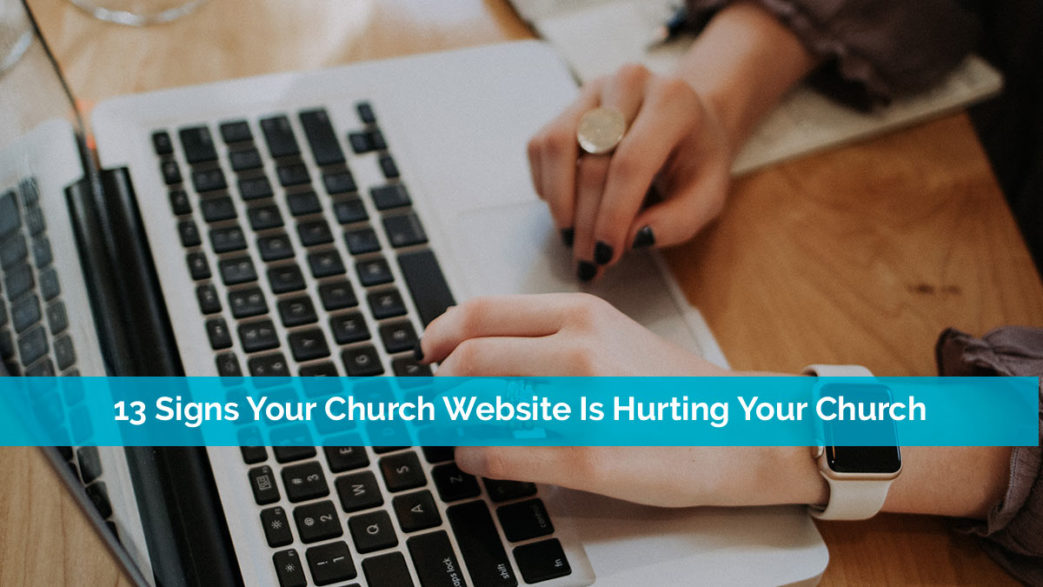When done right, a church website helps your church grow, increases engagement and expands your reach. However, the opposite can happen.
It’s important to look for any signs that your church website is hurting your church. The last thing you want is for your website to drive people away.
You always want your church website to make a great first impression. This keeps people coming back. You also want to make a great impression every time visitors come back to your site. If you notice any of these signs occurring, it’s time to revamp your site.

1. New Visitor Numbers Are Dropping
While it’s not the purpose of all church sites, many churches use their websites to attract new visitors. With Google getting over 3.5 billion searches daily (over 7 billion on the day of writing), people are relying on search engines to help them find things, including new churches.
If you notice new visitors numbers dropping as you start your church website, there may be a problem. In this case, your church website is hurting your ability to attract new visitors.
This could be from a variety of factors include:
- Lack of contact details, such as address, phone number and email address
- No pictures or videos on your site
- Controversial content on your site
- Nothing describing your church
- Slow loading pages (visitors may leave before anything loads)
- No SEO features to help search engines list you (this shouldn’t decrease new visitors numbers, but it will keep them roughly the same as before you launched your church site)
It’s a good idea to review your site to see if it would really appeal to someone who has never encountered your church before. If this was your first impression of the church, would you want to visit?
2. Members Are Complaining
Your church family is usually the first to visit your website when it launches. Listen to everyone’s feedback. If your members are complaining about the site, it may be doing more harm than good.
For example, if you’re uploading sermons, but no one can get them to play, members who can’t attend sometimes won’t be able to engage with your church every week. If your blog posts are angering or upsetting members, your site may have a completely different tone and personality than your actual church.
It’s a good idea to do a soft launch if your site is new. Give your members a password to use the site for at least a month before you go live for the world. Use their feedback to ensure your site is ready to help your church grow versus hurting it.
3. Online Tithing Options Aren’t Secure
Every church website needs a way for people to give online. It’s convenient and allows visitors who can’t attend your church to give as well. However, if you don’t have any online tithing options or they’re not secure, your church website is hurting your church by reducing your donations.
If you’re not already offering online tithing, add it. It gives people one more way to donate to your church. If you offer it, but don’t have a valid SSL certificate for secure giving, secure your site immediately.
Having an SSL certificate secures the connection between your site and visitors. Plus, it can help boost your site rank.
With many churches struggling to support themselves and their local community financially, use your site to collect donations from members and site visitors who appreciate the chance to worship online.

4. It’s Full Of Opinions
If people are coming to your site, it’s usually for one of two reasons. They’re either looking for a new church or a place to worship online. If your church website is just full of opinions versus any real Christian worship resources or guidance, you’ll drive visitors away.
While those who agree with your opinions might stick around, they may still hesitate. Opinions tend to alienate people. You want your church to be welcoming.
Those looking for a new church may think this is how your entire church family acts and thinks. Remember, in the digital age, what you put online stays there forever. A highly controversial opinion on your site could cost you new visitors and existing members.
For those looking to worship online, they just want to feel like part of a community. A highly opinionated church website feels more like daily arguments on social media than a safe place to worship.
Focus on creating useful content for visitors. Avoid posting something hastily out of anger or frustration, even if you’re passionate about the topic. Sometimes, opinions are best kept private.
5. You Never Update It
When was the last time you updated your church website? This includes both the site itself and the content.
Your site needs a slight update at least every year. This can be something as simple as changing your header image or reorganizing your footer to be more useful.
When it comes to content, you should ensure all site content is current. If visitors come to your site and you haven’t updated your Events page in six months, they might wonder if your church is even still active.
If you want to draw more traffic to your site and your church, you need to blog regularly to give search engines more pages to index. More pages lead to more possible ways for visitors to find you. You don’t have to blog all the time, but pick a schedule and stick to it. Even once a month keeps your site updated.
6. You’re Not Getting Site Visitors
One of the clearest signs that your church website is hurting your church is you’re not getting any visitors on your site. This means you’re paying for hosting and possibly maintenance, but not getting anything in return.
Don’t panic though if your site is new. You’re likely not going to get numerous visitors in your first few months. It’s also common to see a spike in the first few weeks that tapers off as your members check it out.
If you’re not getting any visitors, you don’t have to scrap your church website. Instead, you just need to do a little marketing, such as:
- Blogging regularly, such as once a week or at least twice a month (the more often you upload quality content, the quicker you’ll gain traffic)
- Be active on social media and create posts users want to share
- Ask members to please share their favorite blog posts on social media
- Apply for Google Ad grants
Talk to your members as well to see why they’re not using your site. Ask for ideas that would make them want to come back and engage with the site regularly. This is a great way to get ideas for blog content, worship resources and more.

7. It’s Taking Up All Your Time
An often overlooked sign that your church website is hurting your church is the site is taking up all your time. That’s fine if you have a dedicated team for managing your site. However, most small to medium-sized churches don’t have this luxury.
Pastors and other church staff are already overwhelmed. They’re busy, struggle to have any type of personal life, deal with constant pressure to do more and try to please everyone. The last thing they need is to spend hours and hours every week managing a church website.
This takes them away from other important tasks, including ministry. While creating a church site might cause stress at first as you adjust to something new, it shouldn’t continue to add stress. Instead, it should feel exciting and be a useful tool for growing your church.
The best ways to prevent this issue are:
- Have a professional web designer design your site instead of trying to do it yourself
- Create a management schedule to space out tasks
- Delegate tasks so no one is doing it all
- Ask for volunteers to create a volunteer church website team
- Be realistic with your goals, such as just posting one long blog post per month versus four per week
Outside of writing blog posts, you shouldn’t have to spend much time managing your church site each week. If you create a small team of volunteers to moderate comments, update site content (such as events), share content on social media and handle basic maintenance tasks, you’ll free up your time, letting your site help your church instead of hurt it.
8. Staff & Volunteers Are Arguing About It
If your church website is causing fights, it’s not helping. You might find your volunteers and staff arguing over how to run the site, what to post and how to market it. Everyone probably has great ideas, but they won’t all work for your site.
Have a meeting to discuss the purpose of your church website. Let everyone share their ideas. From there, formulate a plan and process for everyone to follow.
With less arguing, everyone accomplishes more. Plus, you have staff and volunteers, leading to a happier overall church family.
9. It Doesn’t Focus On Ministry
Your church site should have a dual purpose. First, you’re providing details to help visitors to your site learn more about your church.
Second, you’re ministering to people online. This includes members who might need guidance and inspiration outside of Sunday services. However, does your site focus on ministry?
It’s not unusual for church websites to focus more on marketing. They can be exciting and encourage people to attend. Blog posts are all about upcoming events or recaps of church newsletters.
Your site needs ministry content too. Create blog posts that are extensions of your sermons. Offer Bible study suggestions for different age groups and situations, such as families or singles. Offer guidance on how parents can guide their children in difficult times. Help those dealing with loss and uncertainty in their life strike up uplifting conversations with God.
Yes, a church website is a marketing tool, but it’s also an engagement tool. Focus on ministry to help all those who visit your site. You may never know how many people you’re reaching overall, but your words and videos have the power to help people far beyond your church walls.

10. It’s Just About Members Or New Visitors
While some churches have two websites, most stick with a single site for everyone. However, if your church is making the site solely about members or just new visitors, your church website is hurting your church.
Your site should help engage your current members and retain them. It also needs to make new visitors feel welcome. When new visitors come to your site, they want to see details about your church and a welcome area on what to expect if they visit your church in person.
Your members want to see details on upcoming events, announcements, volunteer opportunities and more. The great thing is your site can do it all.
If you want a private area just for church members, create a members-only section that’s accessible only by logging in. For new visitors, create a page specifically for them. This will list everything they need to know to navigate your site and visit your church in person.
The rest of your site should be about everyone. You can make announcements, invite people to events, blog and accept online tithes.
11. You Only Use Text
Websites haven’t been text-only in decades. Take a look at your church’s site. Is it mainly text? You might have a logo or header image, but few other images.
People love visuals. If you want your church site to help you, sprinkle more images throughout to show off your church’s personality and help it feel more relatable.
12. You Only Use Images
On the other hand, if your site is nothing but images, it’s hard for visitors to get a feel for who you are. A great church site needs a balance. Add images where they fit.
You can even add short videos to add even more variety to your site. However, you still need at least some text to further explain your images and videos.
13. You’ve Seen No Benefits
The most obvious sign your church website is hurting your church is you’re not seeing any benefits. Your members aren’t more engaged. You’re not seeing people interacting on your site. New visitors are dropping in, even on your website. Social media isn’t even more active as a result of posting links to content on your site.
This means you need to talk to your members and also take a hard look at your site to ensure it’s designed with your goal in mind. It may take some tweaks, but your site will benefit your church when done right.
Need a church website that helps your church instead of hurting it? Contact us today to learn more about our church web design services.





Comments 2
can you take a look at our website, and let us know what can be done for much needy improve.
Hi Vience,
We will most certainly evaluate your current site. I see you scheduled a time to talk. I look forward to speaking then and helping you!